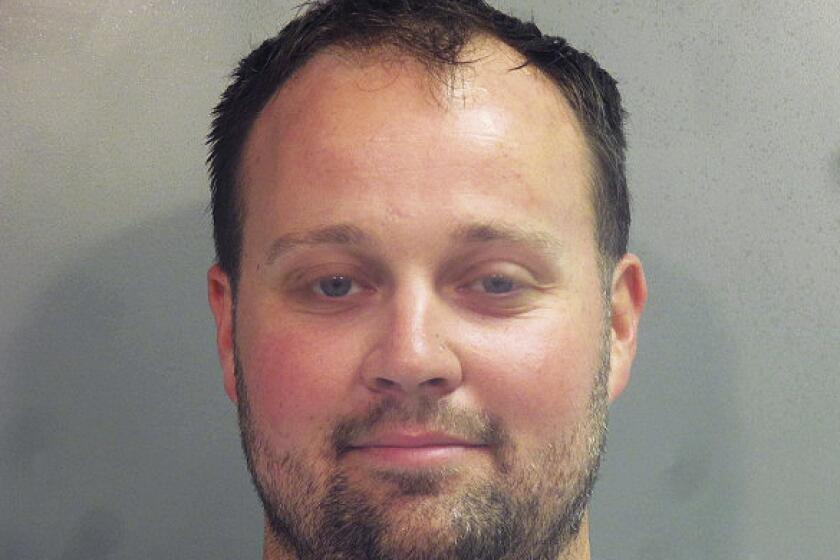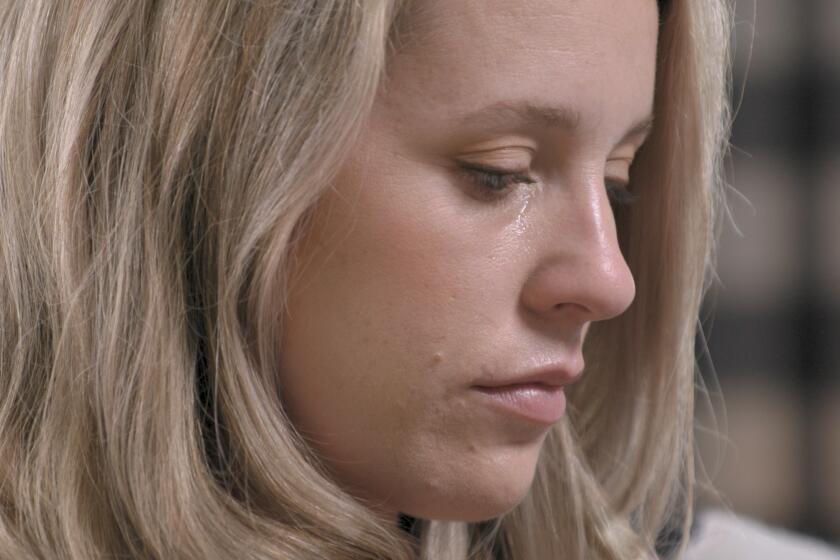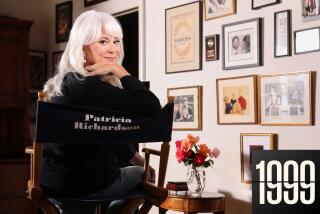‘A vehicle for profit’: Jill Duggar details her family’s reality TV finances in ‘Counting the Cost’

- Share via
For more than a decade, Jill Duggar was the wholesome star of “19 Kids and Counting” and “Counting On,” the sweetly obedient daughter of Jim Bob and Michelle Duggar who became the first woman in the family to marry and seemed destined to follow in her parents’ footsteps. Instead, she’s now calling out her family for exploiting her on reality TV.
In “Counting the Cost,” a memoir released on Tuesday, Duggar sheds unprecedented light on the inner workings of her sprawling Christian fundamentalist family, who rose to fame on the cable network TLC and later saw their empire crumble when first-born son Josh Duggar was convicted on child pornography charges in 2021.
The book details Duggar’s decision to walk away from “Counting On” in 2017 — after spending roughly half her life on camera — and her transformation from the cheerful daughter nicknamed “Sweet Jilly Muffin” into a grown woman who wears pants, uses birth control and drinks the occasional piña colada. However, Duggar is not here to expose every family secret; she does not elaborate on the sexual abuse she allegedly experienced as a child — she remains adamant that the information should never have become public — and her brother Josh is a marginal figure in the story. But she has plenty to say about her family’s finances, the toxic dynamic created by their TV stardom and the role that faith played in it all.
Josh Duggar’s conviction on child pornography charges is the latest scandal involving alleged child sexual abuse by people linked to TLC programs.
“Counting the Cost” paints a critical — if also loving — portrait of family patriarch Jim Bob Duggar, whose obsession with capitalizing on the family’s “window of opportunity” and belief in his God-given authority over his offspring led to their financial exploitation, creating painful rifts that remain unresolved. (The book, published under her maiden name, was written with her husband, Derick Dillard, and author Craig Borlase.) The book details how reality TV made Jim Bob into a wealthy man with an expansive real estate portfolio and a fleet of airplanes at the expense of his children — especially the daughters who juiced TLC’s ratings with each marriage and pregnancy.
Even though Duggar was a major moneymaker for TLC — her televised 2014 wedding to Dillard brought in a record 4.4 million viewers — she alleges that she was not paid for starring in the programs until she waged a protracted, painful legal battle with her parents. She also claims she was tricked by Jim Bob into signing a five-year contract that, among other things, required her to notify the network if she found out she was pregnant.
The book is the latest in a growing number of projects that peel back the curtain on one of reality TV’s most polarizing families. Earlier this year, Duggar’s sister, Jinger Duggar Vuolo, published a memoir, “Becoming Free Indeed,” which offered a careful theological critique of the Institute in Basic Life Principles or IBLP, a nondenominational Christian fundamentalist organization the Duggars were aligned with, and its founder, Bob Gothard — but little criticism of TLC or her parents. The Amazon docuseries “Shiny Happy People: Duggar Family Secrets,” which featured an interview with Jill Duggar and Dillard, was a more forceful exposé of IBLP and the abuse the organization allegedly enabled.
“Counting the Cost” shows how Jim Bob used spiritual beliefs to exert financial and emotional control over his entire family and is likely to be just as devastating. Here’s a look at some of the key takeaways.
Producers paid to finish the Duggar family’s 7,000-square-foot home
Duggar recalls how, in their pre-fame days, her large family lived in a three-bedroom, two-bathroom house and subsisted on canned beans, ramen noodles and frozen burritos. Then they starred in specials for Discovery Health and TLC, which chronicled Michelle’s pregnancies, and their lifestyle quickly changed. Not only did producers pay for groceries once deemed luxury items — like Lucky Charms, frozen pizzas and all-beef chimichangas — but when construction of the family’s 7,000-square-foot dream house took longer than planned, they chipped in to finish the build.
“A second documentary had shown us starting the work on the house, but the producers wanted the third Duggar TV special to feature us actually completing the work and finally moving in. Thanks to some good negotiating from Pops, the network agreed to get out the checkbook,” writes Duggar, the fourth of the family’s 19 children. “A crew of workers turned up to the site, and the producers flew in an interior designer from New York. She helped us pick out the kind of bedroom sets and other furniture that we would never have been able to afford.”
Privacy was sacrificed for entertainment, including Duggar’s relationship with Dillard
Duggar says that her family saw their show, which started as “17 Kids and Counting” and eventually became “19 Kids and Counting,” as a televised ministry — a way to share their religious beliefs with an audience of millions.
But for TLC, the network that turned the Duggars into celebrities, it was different. The show was “a vehicle for profit,” which meant the family had to be entertaining — always willing to sacrifice their privacy for the sake of fresh storylines. “Mom giving birth would always give our ratings a spike, but it wasn’t the only life event that made for great TV. Whenever our producer, Scott, heard that one of us was going to start courting, his eyes would light up like a Christmas tree.” (Duggar doesn’t mention Scott’s last name, but she seems to be referring to series director and executive producer Scott Enlow.)
This became awkward when Duggar planned a trip to Nepal to meet Dillard for the first time to decide if she wanted to pursue courtship and marriage. TLC cameras were going to follow her, but the network would only pay for a five-day trip. She insisted that she needed two weeks to make such a monumental decision and came up with a solution: she and Dillard would film a fake goodbye for the show in order to give the episode a satisfying conclusion, and the couple would get an extra week to get to know each other without the cameras present. When Dillard proposed months later, he “worked with Scott and the crew to deliver the ingredients of a great episode.”
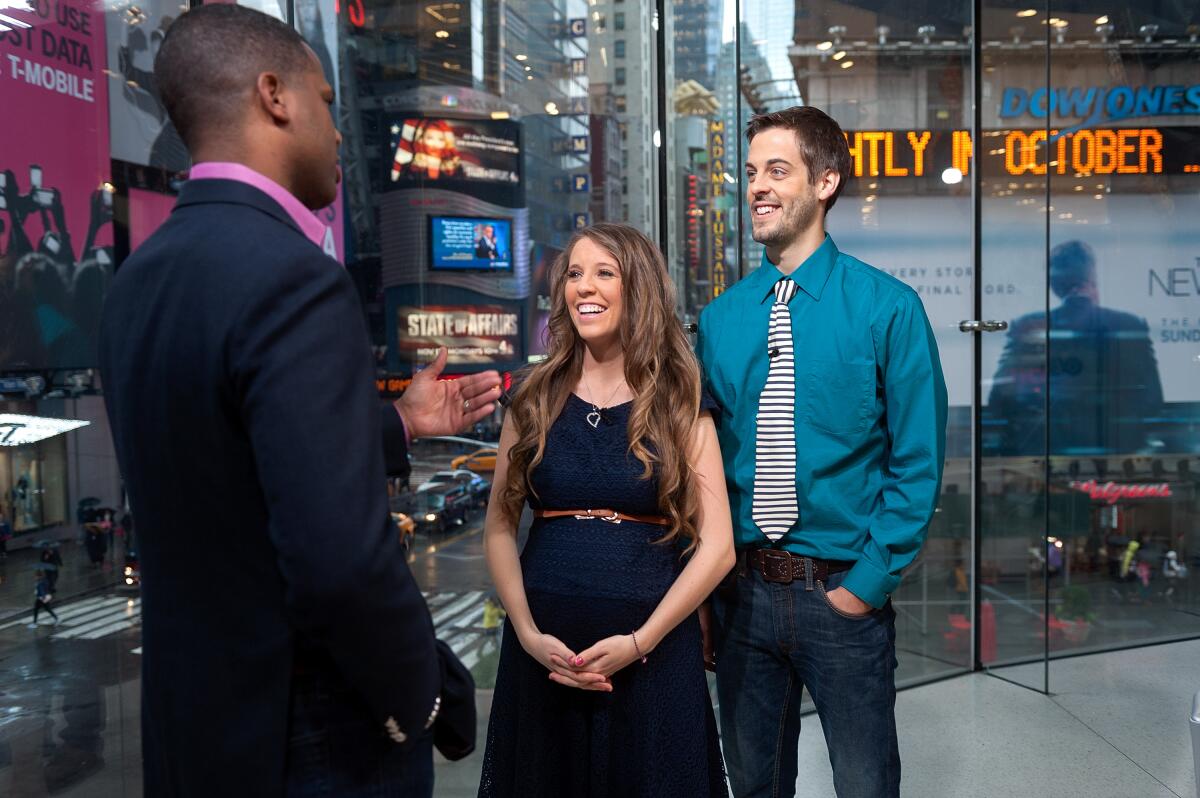
The network also dictated much of their wedding — barring guests from taking pictures and inviting hundreds of people Duggar didn’t know to the festivities — but she didn’t put up a fight. As far as she and Dillard knew, they were not getting paid for the many hours they spent filming the show, but they also considered themselves “volunteers” with a higher purpose: serving the family’s televised ministry.
When it came to her honeymoon, however, she was more resistant, making it clear filming was not an option. In turn, “they made it clear there wasn’t any money from them to help with the honeymoon, either,” she writes.
Duggar had to tell producers about her pregnancies first
A month after her wedding in 2014, Duggar found out she was pregnant. The happy news was followed by a quick realization that she would have no say in how — or if — the world learned about her growing family.
Because her mother and her sister-in-law, Anna, had given birth many times since the show began, “there was already a clear path that we had to follow — not just involving some media outlet being given exclusive rights to the official announcement, but also how we told those closest to us,” she writes. “First, we were supposed to tell producers, then — when they were ready to capture it on film — we were allowed to tell our parents.”
TLC’s talent management team also had a PR plan in place: People magazine would get rights to the story and a photoshoot. Duggar and Dillard couldn’t tell anyone except a few friends and family members before the People story was published.
Duggar didn’t want to film the birth of her first child but feared rebelling
Duggar was also reluctant to give birth on the show. Trained as a midwife, she understood the risks inherent to labor and knew that “in that most intimate, vulnerable place of childbirth, I’d value my privacy more than ever,” she writes. She told Enlow that she didn’t want to film the birth, but he pushed back. They eventually reached a compromise: her mom and sister Jana would film some of the birth with video cameras provided by production. Duggar’s 70-hour labor, which resulted in a C-section and the birth of her first child, Israel, was featured in a two-hour special that garnered 3 million viewers.
Though she didn’t realize it at the time, Duggar says IBLP’s teachings about the “umbrella of authority” were so deeply ingrained that it clouded her judgment. “My father wanted us to cooperate with the show, therefore deceiving Scott could be seen as an act of sinful rebellion against my father.” By the time she gave birth to her second child in 2017 — rupturing her uterus in the process — Duggar had quietly left the show. Her third child was born last year.
The team behind ‘Shiny Happy People’ breaks down their investigation into the dark side of TLC’s favorite family — with help from within.
She says she unknowingly signed a contract that locked her into the show for five years
In “Counting the Cost,” Duggar repeats the claim, first made in “Shiny Happy People,” that she was unknowingly locked into a five-year contract with TLC when her father handed her a single page to sign on the frenzied day before her 2014 wedding and offered no further explanation.
She says that she and Dillard only learned of the contract in early 2016, when they were in El Salvador on a mission and declined to return to the United States to film a promotion for “Counting On: Jill and Jessa,” the spinoff created when “19 Kids and Counting” was canceled.
They were told by a man named Chad, who worked with Jim Bob on business dealings, that she had a legal obligation to film the promo per a five-year contract she had signed in 2014. (Duggar does not disclose Chad’s last name in her book, but according to “Shiny Happy People,” Chad Gallagher, an Arkansas political consultant with ties to former Gov. Mike Huckabee, played a key role behind the scenes in the Duggar family.)
Duggar says Jim Bob continued to pressure her into filming the promo, allegedly saying she would get sued if she didn’t fulfill her commitment and that it would be her fault if TLC canceled “Counting On.” “Are you gonna be OK carrying that burden?” he allegedly asked. Jim Bob eventually showed up unannounced, on their doorstep in El Salvador, and filmed the awkward reunion.
Duggar says she tried for years to obtain a full, unredacted copy for the contract, which included the clause that stated she had to reveal to the network‘s producers first if she discovered she was pregnant.
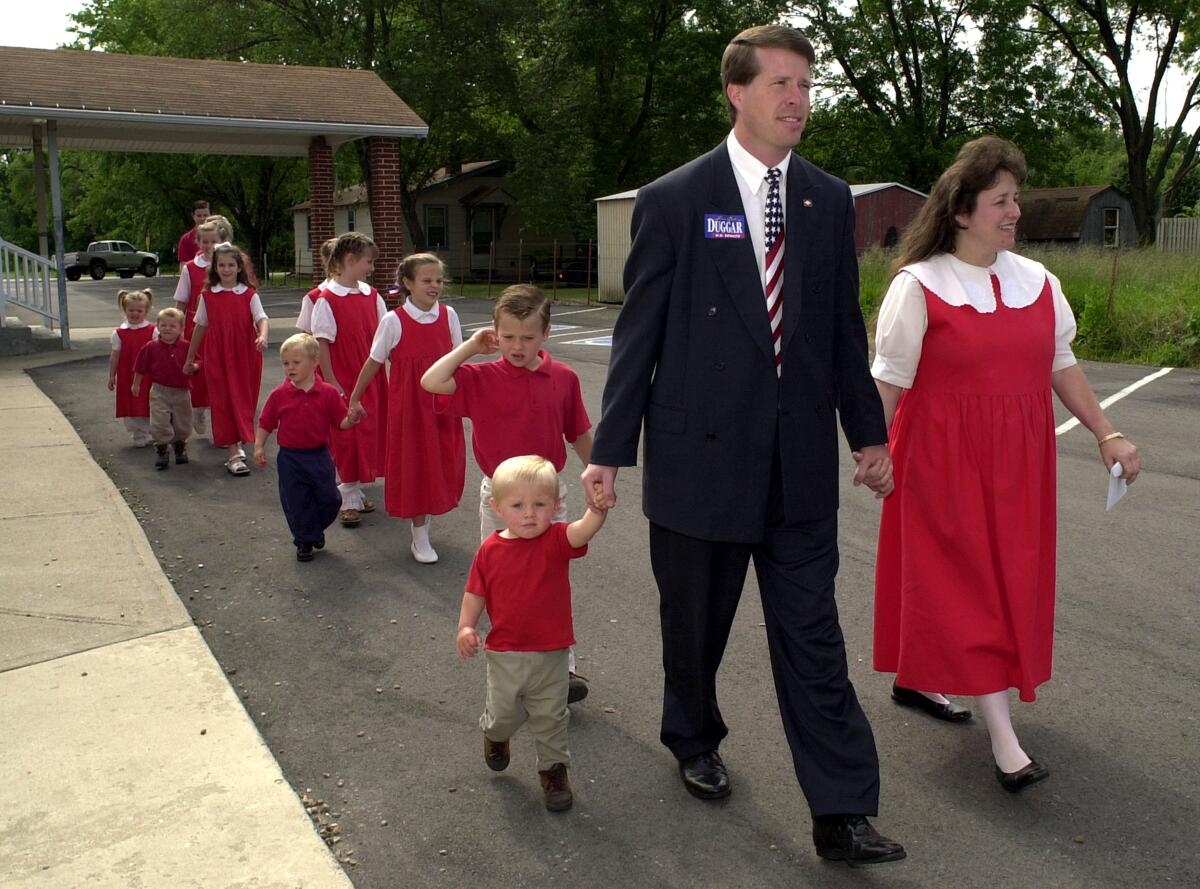
After refusing to pay his children, Jim Bob eventually offered each $80,000
Not long after Duggar and Dillard started to ask questions about their obligations to the show, Jim Bob made a surprising offer to each of his children, who were eager for a slice of the wealth the show had brought the family: He’d pay a one-time fee of $80,000 if they signed a contract with Mad Family, his and Michelle’s company. The contract was extreme, requiring the younger Duggars to make themselves and their children available to any show that Mad Family was a part of and it barred them from negotiating their fee. They would also have to sign a lifetime nondisclosure agreement and were warned against discussing the contract with any of their siblings so as not to “stir contention among the brethren.” “To me, at that time, the level of secrecy and control Pops exerted on us felt normal,” Duggar writes.
Duggar refused to sign the contract, despite a pressure campaign mounted by several siblings, and eventually Jim Bob gave them the $80,000 anyway. But the saga was far from over.
Duggar says Jim Bob’s accountant told the IRS they were paid $130,000, not $80,000
In one of the most explosive — and potentially damning — allegations in the book, Duggar says that she and her husband received a letter from the IRS in 2018 indicating that they had been paid roughly $130,000 — more than the one-time $80,000 payment they actually received from Jim Bob. They pushed Jim Bob to pay them the difference; he responded by sending an itemized list of expenses that he considered “payment,” including utilities, education expenses, family meals for 12 years ($3 per day, for a total of $13,140) and a $15,000 harp.
‘Shiny Happy People’ dives into the fall of the Duggars, stars of TLC’s ’19 Kids and Counting’ and its spinoff. Here are six revelations from the series.
She estimates the family was paid $8 million over the course of the series
After pleading for years, Duggar says she eventually got a full, unredacted copy of the 2014 contract — not from her father or his lawyer, but from her mother, Michelle, who slipped it under her front door late one night.
The contract stated that for each half-hour episode, Mad Family would be paid $50,000. For hour-long episodes, they received $65,000. After Season 3, the numbers went up to $58,000 and $73,000.
“We estimated that TLC had paid Mad Family Inc. over $8,000,000 total,” she writes in the book. “Our wedding alone had netted well over $100,000 for Pops, and Israel’s birth had been the focus of two special episodes, earning Pops another six-figure sum. Yet when we’d asked him to cover our $10,000 deductible and out-of-pocket expenses from the hospital stay, he’d pushed back.”
Meanwhile, Jim Bob had acquired numerous real estate properties and a fleet of private planes, including one with 10 seats. “He’d grown rich off the show and had fought hard to keep that under wraps,” Duggar says.
Duggar and Dillard eventually got Jim Bob to pay them $175,000 for their contributions to the show, but it came at great personal cost.
“I felt like maybe my parents and most of my siblings thought I was greedy, and that Derick and I were horrible people for what we’d done to the family. Maybe they were right,” Duggar writes. “I never knew that victory could feel so hollow or so overwhelmingly sad.”

‘You treat me worse than you treat my pedophile brother’
One of the most powerful themes in “Counting the Cost” is Duggar’s quest to untangle her own beliefs from the fear-based teachings of the IBLP — a group she describes as a cult. She writes at length about deciding to wear pants and pierce her nose, unremarkable style choices that were nevertheless forbidden to IBLP followers. Jim Bob, who kept tabs on his adult children through Google news alerts, was furious about Jill’s new look, and signaled his disapproval by sending text messages with Bible verses about honoring “thy mother and father.”
For a time, Jim Bob even barred Jill from visiting the “Big House” — the large family home where her younger siblings lived — when he was not present. During an intense, tearful mediation session, Duggar lashed out at her controlling father, saying, “You treat me worse than you treat my pedophile brother.”
“He hated the hunk of metal in my nose. He despised how I was dressing in ways that put sexual thoughts in guys’ minds,” she writes. “Instead of his Sweet Jilly Muffin, I was now a threat to the rest of his children, and a threat to his authority.”
More to Read
The complete guide to home viewing
Get Screen Gab for everything about the TV shows and streaming movies everyone’s talking about.
You may occasionally receive promotional content from the Los Angeles Times.
